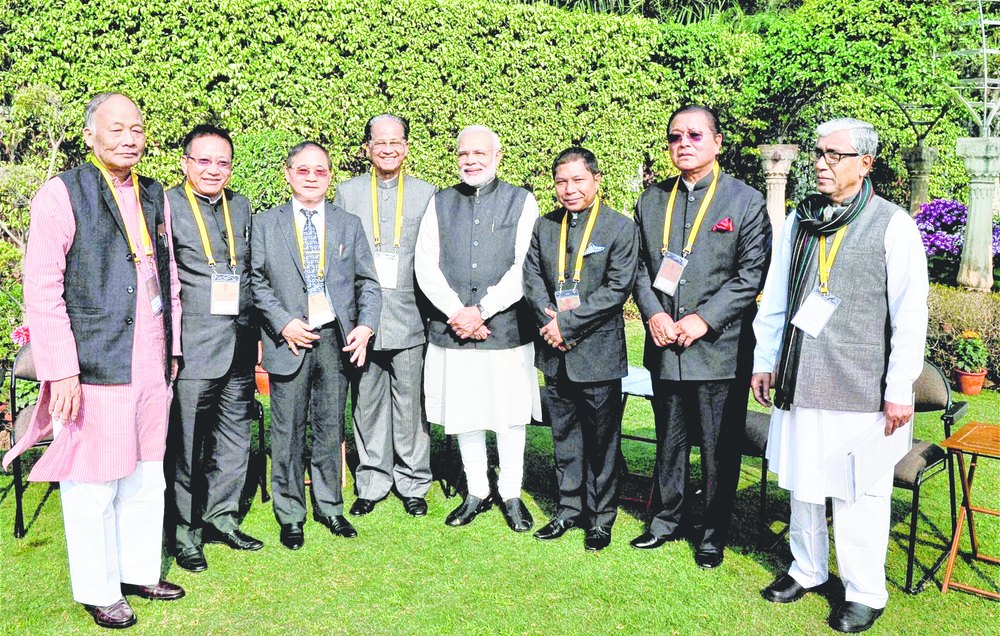North-East United on Not Being United
CM'S of NE states with the PM; Photo Credits:PTI

NEW DELHI: The Chief Ministers of the North-East India were seen unitedly standing on the same side of the court urging the Centre to not cluster all the states in the N-E as “one” on the first meeting of the newly founded Niti Aayog which was held at New Delhi on Sunday.
The CM’S unified on at least two of the major issues discussed during the meeting. One pertained to the advocacy of the regional councils with the states making a vehement appeal to the Central government to enhance the role of the North Eastern Council (NEC). The other contentious issue was that of the alterations in financial assistance to these states after the new Niti Ayog replaced the older Planning Commission. Most of these states are usually cash-strapped, they claimed and thus seemed to be quite apprehensive about this change.
Whilst the Prime Minister, who chaired this meeting, talked about forging a model of “cooperative federalism” asking the states to work in tandem with the Centre, the North-East states demanded separate individual treatment to each state and refuted the ‘one-size fits all’ policy.
The representatives of the states further highlighted the need for improving the planning and more importantly, the implementation of various projects that were/ are designed for their states.
Assam Chief Minister took the lead (quite obviously) in raising apprehensions about the changes in the financial assistance and emphasised on the need to continue with the older 90:10 grant-to-loan system.
“There should be no change in this format," he added, eliciting support on the issue from his counterparts.Gogoi also said there should be no dilution of the special-category status for the northeastern states.
He further rued on Modi's focus on shifting from plan to market economy and asserted that it would harm smaller and backward states like Assam and would rather benefit only the industrial states like Gujarat.
Speaking about specific developments for the North East,Gogoi said “While advocating the strengthening and revamping of NEC as a body for regional planning, I would affirm that intra-region uniqueness of states in terms of problems, population and possibilities should not be lost sight of. While there are common threads that weave a pattern in the Northeast, there is also a need to address each state individually, given the differences in size and complexities. I would urge the Niti Aayog to work closely with regional councils and individual states, addressing shared concerns and unique needs simultaneously”.
Nagaland Chief Minister T.R. Zeliang also affirmed his stand on enhancing the role of the NEC. should be enhanced.
He demanded that the Chief Ministers' council under the aegis of Niti Aayog should be able to decide which schemes the Centre could run and which ones be given to the states and decide on the central funds that could be allocated.
Zeliang also mentioned the pending projects in Nagaland like the airport at Razuphema between Dimapur and Kohima and the Dimapur-Tizit railway line, which he proposed be made a "national project".
Meghalaya seemed to have quite different concerns and demands.
CM Mukul Sangma’s priority was to rather get the mining sector running. Since the National Green Tribunal has banned coal mining in the state, he proposed a law should be enacted to leave decision on mining to the northeastern states only.
Meanwhile, Mizoram Chief Minister Lal Thanhawla while agreeing with his counterparts on not treating north-east as one cluster but rather treating each separately, he also wanted a speedy dovetailing of the Act East policy with the process to integrate the Northeast to Southeast Asia.
"The Northeast needs special attention. The agenda papers seem to be devoid of adequate emphasis on the development of the Northeast and the implementation of the Act East policy," he remarked, adding “Sooner the economy of the region is integrated with the economy of Southeast Asia, the better it will be for the Northeast and the country as a whole”.
Thanhawla further echoed more or less similar views on the NEC and special-category status.
While stating that NEC should be made an operative extension of the Niti Aayog giving it effective participatory role in the central planning body, he added that the status of any of the 11 special-category states in the country should not be changed.
Arunachal Chief Minister Nabam Tuki reiterated the view on the special-category states and on fund allocation with again advocating for a regional council for the North Eastern Region.
He, slightly deviating from others, gave an alternative suggestion for a Hill States Council (HSC) or a Himalayan States Council (HSC) due to similar strengths and challenges of these small states as they have low resource base, low population and had been a late starter in the journey of development, as per the CMO release.
Further, Tuki requested the NITI Aayog to consider Arunachal Pradesh on grounds of border management by developing border areas, to harness the hydropower and mineral potential of the state and provide a special package for the vast forest cover of the state.



